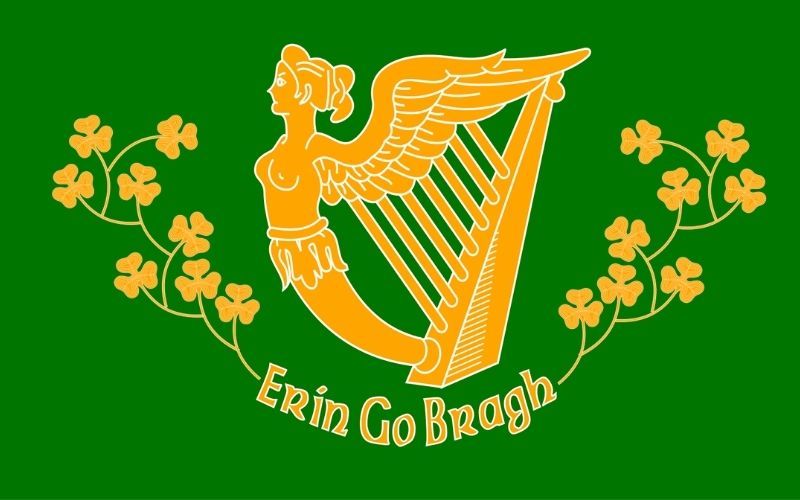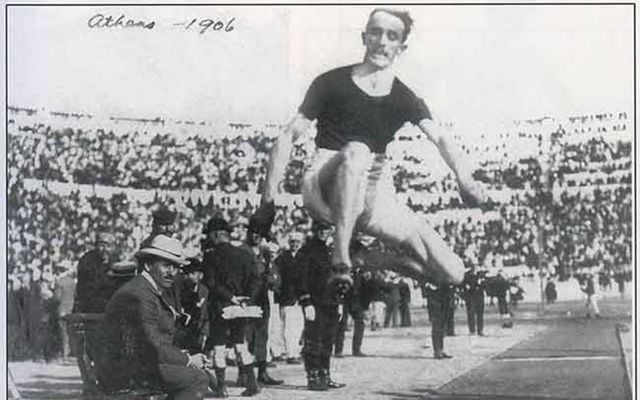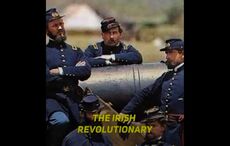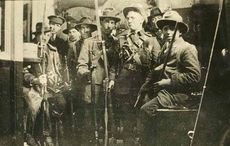Peter O'Connor showed real Irish pride and daring at the 1906 Greece Olympics.
It was a full decade before the 1916 Easter Rising in Dublin, but by 1906, the Gaelic Athletic Association (GAA), founded in 1884, had instilled in its members a nationalist pride, a pride that would see one of its most famed long-jumpers take matters into his own hands when forced to stand below the British flag.
In 1906, Peter O’Connor, Con Leahy, and John Daly were put forward for the Olympics [the 1906 Games were official at the time, but are no longer recognized by the IOC] by the GAA and the Irish Amateur Athletic Association (IAAA).
The three Irishmen traveled to Greece in green blazers and shamrock-emblazoned caps, and they had with them their Irish flag, the old 'Erin Go Bragh' flag with a golden harp showing on a green background.

An Erin Go Bragh flag. (Public Domain / John Patrick O'Riley (Brevet Major) via Wikimedia Commons)
When they arrived, however, a technicality in the rules meant that they were not able to compete as Irish since Ireland did not have its own Olympic Council to nominate them to compete.
Worst of all, the Olympians were now to be classed as British, a nationality that none of them was too happy to be representing.
O’Connor was a favorite for gold in his jumping events. He had already broken the world record held by his main rival, American Myer Prinstein. He competed in the long jump and the triple jump (then called the hop, step, and jump). He arrived in Greece with ten years of consistent victories over British competitors in his back pocket. He had also previously refused to compete at the 1900 Olympics on the British team.
Although born in England where his father was temporarily employed, O'Connor was raised in Co Wicklow in Ireland. He joined the GAA two years after its inception and won many All-Ireland titles. He was the first person ever to set a long jump world record with the International Association of Athletics Federations on August 5, 1901. His record remained unbroken for 20 years and remained an Irish record for an outstanding 89 years.
And so with this track record, it could be said that O’Connor was confident going into his long jump competition until it was revealed that the only judge was to be Matthew Halpin, manager of the American team.
Although O’Connor protested, his claims of bias were overruled and in the end, he finished second. The distances jumped were announced by Halpin only at the end of the entire competition and he declared his American athlete the victor.
To add insult to injury, the Irishman was now going to have to stand under the British flag as he was honored for the silver medal, a sign of disrespect that, it turned out, he would not tolerate.
As the Union Jack was raised, O’Connor used his jumping prowess to scale up the flagpole, holding out the Erin go Bragh flag to replace its British counterpart and becoming one of the first people to ever bring politics into sports in such a manner. He was protected from the ground by his teammates from Ireland.
O'Connor would go on to win gold in his second event, the triple jump, against his fellow Irishman Con Leahy, who had stood by his side during the flag protest. He did not make a second attempt at a flag jump at the ceremony for his gold medal, however. Nonetheless, O’Connor made one of the most historic sporting event protests Ireland has ever seen and is heralded for his defiance of the British team.
He would never compete in another Olympic event and unfortunately, as the 1906 Olympics came to be later recognized as Intercalated Games, his medals are not officially recognized now.
O'Connor would return to the Games in later years as both a judge and a spectator but while still a fan of the sport, he set his sights instead on his law practice Peter O’Connor and Sons instead, which still operates in Waterford and Dublin to this day.
H/T: Reddit /DingDongInDaPingPong
*Originally published in Feb 2018, last updated in Dec 2020.




Comments